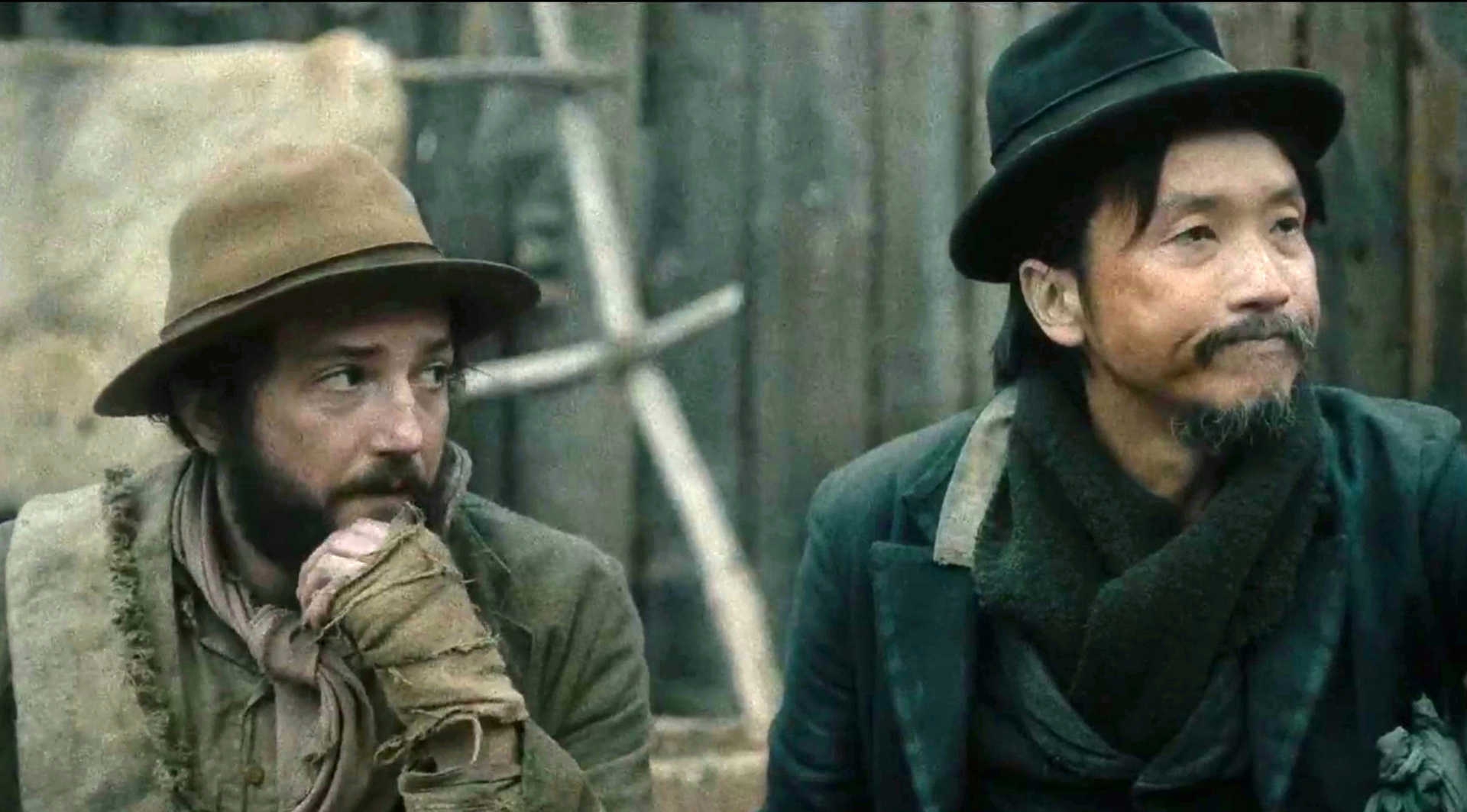First Cow
 for brief strong language.
for brief strong language.
Reviewed by: David Cook
CONTRIBUTOR
| Moral Rating: | Average to Offensive |
| Moviemaking Quality: |
|
| Primary Audience: | Adults |
| Genre: | Arthouse Western Drama Adaptation |
| Length: | 2 hr. 2 min. |
| Year of Release: | 2019 |
| USA Release: |
August 30, 2019 (festival) March 6, 2020 (limited release) March 6, 2020 (wide release) DVD: July 8, 2020 July 10, 2020 (Internet) |
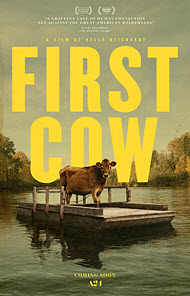

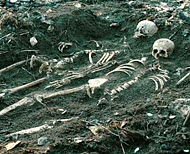
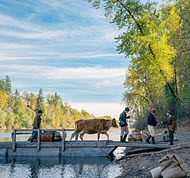
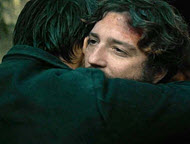
Human connections
Friendship between men which includes loyalty
Oregon Territory
Harsh realities of life in the Old West
Selfishness and self-righteousness
What does Scripture say about STEALING? Answer
People’s self justification of their selfish sinful actions, such as stealing and cheating
What is SIN AND WICKEDNESS? Is it just “bad people” that are sinners, or are YOU a sinner? Answer

About the fall of mankind
What is RIGHTEOUSNESS?
About GOODNESS?
Are you good enough to get to Heaven? Answer
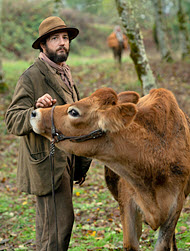
Cooks in the Bible
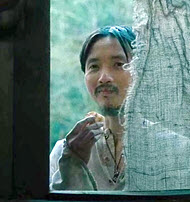
Chinese immigrants in the 1820s
Fur trappers
What does Scripture say about STEALING? Answer
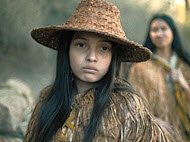
Native Americans
RACISM—What are the consequences of racial prejudice and false beliefs about the origin of races? Answer
About murders
Uncovering buried skeletons / mass graves
About physical death and eternal death
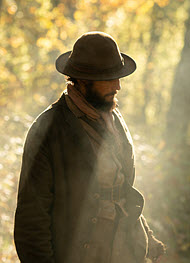

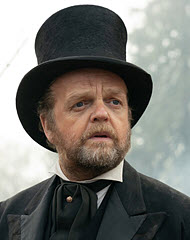
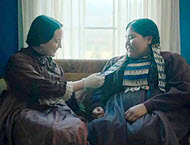
| Featuring |
|---|
|
John Magaro … Otis “Cookie” Figowitz Orion Lee … King-Lu Toby Jones … Chief Factor Rene Auberjonois (René Aubergenois) … Man with Raven Ewen Bremner … Lloyd Scott Shepherd … Captain Gary Farmer … Totillicum See all » |
| Director |
|
Kelly Reichardt |
| Producer |
|
IAC Films Film Science See all » |
| Distributor |
This film is based on the book The Half-Life: A Novel (2004) by Jonathan Raymond.
Early in Kelly Reichardt’s “First Cow,” King-Lu invites Cookie to rest in his feeble shack as he splits firewood. Instead of resting, Cookie is inclined to sweep the dirt floors, beat the fur carpet, and adorn the table with freshly picked flowers. It’s a simple scene. It has minimal dialog and stagnant camera movement. It’s pure—even mundane, and that’s what makes it impactful. The gentle kindness perfectly defines our characters and prepares us for the journey they are about to take.
“First Cow” takes place in the Oregon Territory in the 19th century. Cookie (John Magaro) is a cook traveling with a group of fur trappers. As they hunt, he gathers and prepares their meals. He feels like an outsider until he meets King-Lu (Orion Lee), a Chinese immigrant. The two strike up an unlikely friendship.
They live in a shack on the outskirts of a growing settlement. Their days drag on as they scrape by to make a humble living. However, everything changes when the first cow arrives in the region. Cookie imagines the possibilities that cow’s milk would bring to his cooking. Figuring it won’t hurt anyone, the two steal a small portion of the cow’s milk one night and use it for baking. King-Lu imagines the possibilities of selling the delicious food. He convinces Cookie to secretly milk the cow each night, so they can sell oily-cakes at the settlement. Their small, seemingly-harmless crime begins to pave a way for them to become successful businessmen, but this endeavor becomes potentially very dangerous.
As the film award-season approaches, you will hear “First Cow” mentioned frequently. From acclaimed director Kelly Reichardt (“Wendy and Lucy,” “Meek’s Cutoff”), this film separates itself from other films of today. It’s quiet. It’s slow. It’s modest. Unfortunately, Reichardt’s sedate style may deter many moviegoers. She ignores the standard pace and style of storytelling that most films follow. Rather than using a closeup to direct the audience’s gaze, she will leave the frame wide—allowing the audience to freely explore the scene on their own. She trusts her audience. She allows them to come up with their own conclusions. As a result, the audience participates in the characters’ journey—understanding their turmoil, their happiness, and even their boredom. And once the suspense finally builds, it’s in a whisper.
Friendship is at the core of “First Cow.” Cookie and King-Lu are very different, but their differences bond them. Cookie is sweet and kind, while King-Lu is smart and shrewd. This allows King-Lu to see the opportunity at their fingertips, but Cookie’s morals lead to apprehension. However, the temptation is too great. The two decide to steal the necessary milk to start their venture. As they find success, the temptation to steal more and more milk magnifies. There is never enough. They always need more. Their sin in never quenched.
“Just as Death and Destruction are never satisfied, so human desire is never satisfied.” —Proverbs 27:20
“Temptation comes from our own desires, which entice us and drag us away. These desires give birth to sinful actions. And when sin is allowed to grow, it gives birth to death.” —James 1:14-15
“For the wages of sin is death, but the gracious gift of God is eternal life in Christ Jesus our Lord.” —Romans 6:23
I’ve heard “First Cow” characterized as a parable, and I think that’s an appropriate description. It deals with sin and its ramifications. It shows the value of kindness and friendship. It allegorizes capitalism, racism, and the American Dream. It emphasizes joy—a Fruit of the Spirit (Galatians 5:22). When a character peals off a small piece of biscuit and tastes it, you fully understand how amazing that simple joy can be. It starkly contrasts our culture today that is never satiated. The film itself was a similar joy for me. It is not loud and bombastic like the majority of today’s films, but it created a happiness that reached much deeper. Quietly and slowly, “First Cow” warmed me like one of Cookie’s honey glazed oily-cakes, and the taste lingers with me.
- Violence: Moderate
- Drugs/Alcohol: Moderate (drinking and smoking, but no other drugs)
- Vulgar/Crude language: Moderate— f-word (1), “son of a b*tch”
- Profane language: Moderate— • “G*d d*mn it,”d*mn,” “h*ll”
- Occult: Minor— reference to a local belief about a spirit
- Nudity: Minor
- Sex: None
See list of Relevant Issues—questions-and-answers.


PLEASE share your observations and insights to be posted here.
